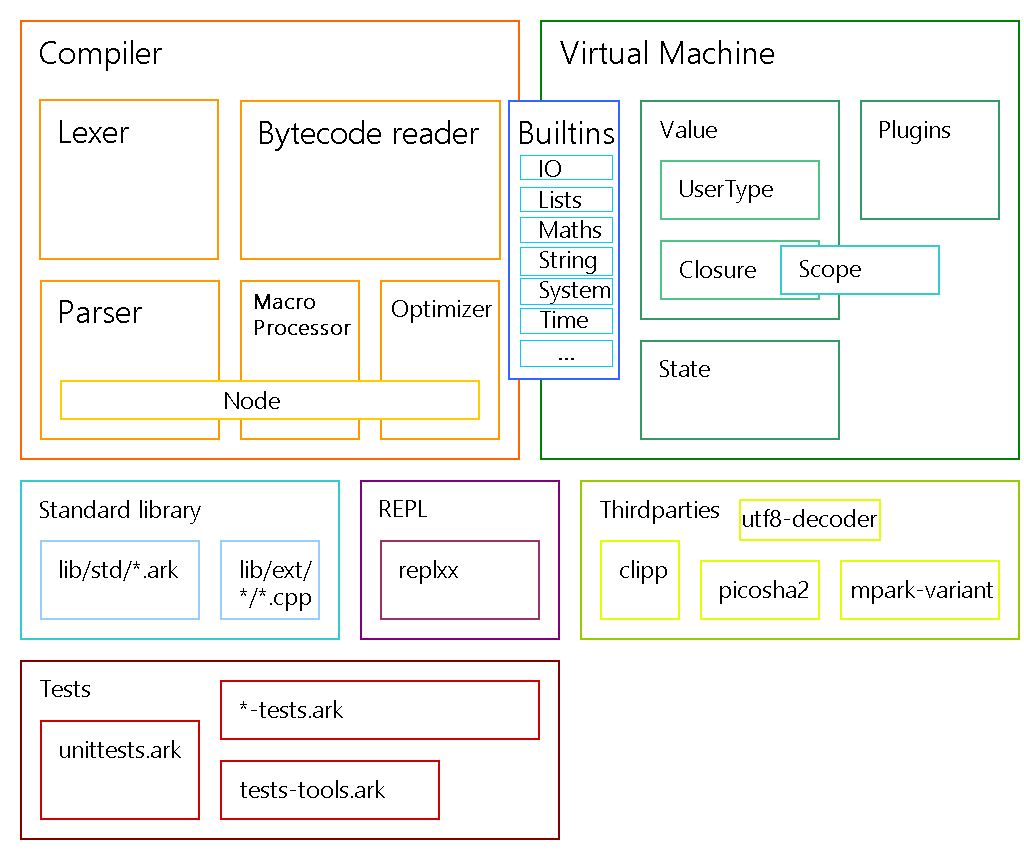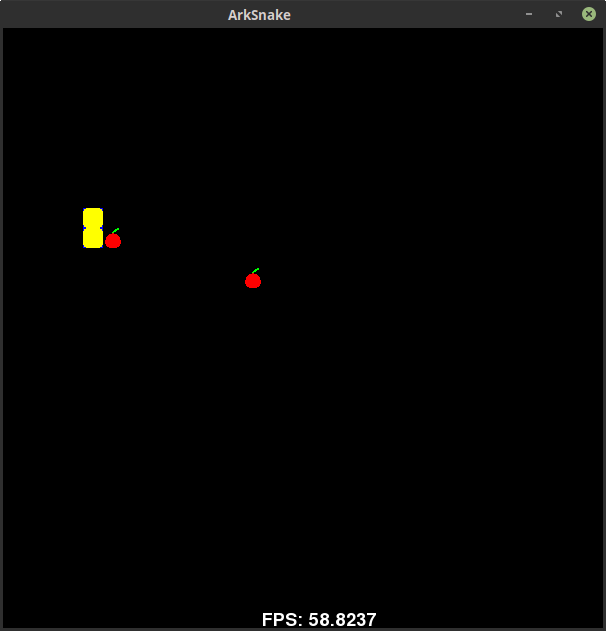- Documentation
- Discord server: invite link, to discuss the specification of the language and receive help
- Modules
Nota bene: the project is referred as "Ark" and as "ArkScript". The official public name is "ArkScript" since "Ark" is already being used by another language
ArkScript is
- small: the compiler and the virtual machines fit under 8000 lines, but also small in terms of keywords (it has only 10)!
- a scripting language: it's very easy to embed it in your application. The builtin construction is quite easy to understand, so adding your own functions to the virtual machine is effortless
- portable: it produces a bytecode which is run by its virtual machine, the same way Java does it (with a smaller memory footprint)
- a functional language: every parameter is passed by value, everything is immutable unless you use
mutto specify your need of mutability - powerful: it can handle object-oriented programming in a very elegant way with its closures and explicit captures (see
examples/closures.ark) - promoting functionalities before performances: expressiveness often brings more productivity, even though performances aren't left behind
- easy to compile: it takes less than 200ms to compile and check a complex code with a lot of branches and sub-branches of 200 lines.
- a Lisp-like, but with fewer parentheses:
[...]is expanded to(list ...)and{}to(begin ...). More shorthands will come in the future. - extensible: it is very easy to create a C++ module to use it in the language, adding functionalities
Also it has:
- macros: if/else, values, and functions
- a REPL with autocompletion and coloration
- a growing standard library, composed of ArkScript code (under
lib/std/) and C++ (underlib/ext/) - a lot of unit tests (but never enough), which are ran before every release to ensure everything work as intended
- docker images to try the language without compiling it:
(let fibo (fun (n)
(if (< n 2)
n
(+ (fibo (- n 1)) (fibo (- n 2))))))
(print (fibo 28)) # display 317811(import "random.arkm")
(import "Math.ark")
(let number (mod (abs (random)) 10000))
(mut value 0)
(mut tries 0)
(mut continue true)
(while continue {
(set value (toNumber (input "Input a numeric value: ")))
(if (< value number)
# then
(print "More!")
# else
(if (= value number)
# then
{
(print "Bingo!")
(set continue false)
}
# else
(print "Less!")))
(set tries (+ 1 tries))
})
(print "You won in " tries " tries")More examples are available under the folder examples/.
Linux only
Important: this method will add the folder where ArkScript will be downloaded to your PATH. The executable being named ark you can have conflicts with another existing program named ark as well, a KDE archiving tool.
Save the following code as install_arkscript.sh and run bash install_arkscript.sh.
#!/usr/bin/env bash
set -euo pipefail
mkdir -p "${HOME}/.ark"
cd "${HOME}/.ark"
install_dir=`pwd`
current=`curl -s https://github.com/ArkScript-lang/Ark/releases/latest | egrep -o "tag/(?[^\"]+)" | cut -c 5- -`
url="https://github.com/ArkScript-lang/Ark/releases/download/$current/linux64.zip"
wget --quiet $url
if [ -f linux64.zip ]; then
unzip -o linux64.zip
rm linux64.zip
fi
# export arkscript path to your PATH variable to call it from everywhere
# export also ARKSCRIPT_PATH for arkscript to find its standard library
shellrc=""
path_update="export PATH=\"\$PATH:${install_dir}\""
SHELL=$(echo $SHELL | rev | cut -d'/' -f 1 | rev)
case $SHELL in
"fish")
shellrc="$HOME/.config/fish/config.fish"
path_update="set PATH $install_dir \$PATH"
;;
"zsh")
shellrc="$HOME/.zshrc"
;;
"bash")
shellrc="$HOME/.bashrc"
;;
*)
echo "Unsupported shell: $SHELL. Please open an issue at <https://github.com/ArkScript-lang/Ark/issues/new> to request it."
exit 1
;;
esac
cat >> ${shellrc}<< EOF
$path_update
export ARKSCRIPT_PATH="${install_dir}"
EOF
echo "Don't forget to reload your shell configuration (\`source ${shellrc}\`) to refresh your path."$ docker pull arkscript/stable:latest- First, fork the repository
- Then, clone your fork:
git clone [email protected]:username/Ark.git - Create a branch for your feature:
git checkout -b feat-my-awesome-idea - When you're done, push it to your fork and submit a pull request!
Don't know what to work on? No worries, we have a list of things to do 😉
We have other projects tightly related to ArkScript, which aren't necessarily C++ oriented:
- the Request For Comments, where we discuss new features for the language
- the standard library, written in ArkScript itself
- the standard library modules, extending the capacities of the language, written in C++
- ArkDoc, a documentation generator à la doxygen, for ArkScript, written in Ruby
- our website written in HTML, CSS and JavaScript
Who worked on
- the standard library
- the builtins
- the REPL
- the CLI
- the documentation
- the language specification
- the logo
- the docker integration
See Coding guidelines if you want to write ArkScript for the library (see folder lib/std/).
For performance reasons, some functions might be written in C++, in include/Ark/Builtins/Builtins.hpp and src/Builtins/.
- C++17
- CMake >= 3.12
- Visual Studio >= 11 (on Windows)
- On macOS versions prior to 10.15,
libc++lacksfilesystemin the standard library.- Install a newer compiler using Homebrew:
brew install gcc && brew link gcc - Pass compiler path to
cmakein the build step:-DCMAKE_CXX_COMPILER=/usr/local/bin/g++-9
- Install a newer compiler using Homebrew:
All the external libraries we use are already included in thirdparties.
Different CMake switches are available to customize the build:
-DARK_BUILD_EXEto generate an executable, defaults to Off, building a shared library only-DARK_ENABLE_SYSTEMto enablesys:exec(execute shell commands without restrictions), defaults to On-DARK_PROFILERto enable the coz profiler, defaults to Off-DARK_PROFILER_COUNTto count every creation/copy/move of the internal value type, defaults to Off-DARK_SCOPE_DICHOTOMYto activate the dichotomic mode of the scope, defaults to Off
# first, clone it
~$ git clone --depth=50 --branch=dev https://github.com/ArkScript-lang/Ark.git
~/Ark$ cd Ark
~/Ark$ git submodule update --init --recursive
# building Ark
~/Ark$ cmake . -Bbuild -DCMAKE_BUILD_TYPE=Release -DARK_BUILD_EXE=On
~/Ark$ cmake --build build --config Release
# installing Ark (might need administrative privileges)
~/Ark$ cmake --install build --config Release
# running
~/Ark$ ark --help
DESCRIPTION
ArkScript programming language
SYNOPSIS
ark -h
ark -v
ark --dev-info
ark -e <expression>
ark -c <file> [-d]
ark -bcr <file> [-(a|st|vt|cs)] [-p <page>] [-s <start> <end>]
ark <file> [-d] [-L <lib_dir>] [-f(fac|no-fac)] [-f(ruv|no-ruv)]
OPTIONS
-h, --help Display this message
-v, --version Display ArkScript version and exit
--dev-info Display development information and exit
-e, --eval Evaluate ArkScript expression
-c, --compile Compile the given program to bytecode, but do not run
-d, --debug... Increase debug level (default: 0)
-bcr, --bytecode-reader Launch the bytecode reader
-a, --all Display all the bytecode segments (default)
-st, --symbols Display only the symbols table
-vt, --values Display only the values table
-cs, --code Display only the code segments
-p, --page Set the bytecode reader code segment to display
-s, --slice Select a slice of instructions in the bytecode
-L, --lib Set the location of the ArkScript standard library
-f(fac|no-fac) Toggle function arity checks (default: ON)
-f(ruv|no-ruv) Remove unused variables (default: ON)
LICENSE
Mozilla Public License 2.0See https://github.com/ArkScript-lang/benchmarks
You can find a snake created in ArkScript in the folder examples/games/snake (run it from there, otherwise it won't find the font and the sprites ; you won't need to install the SFML).
Controls are the arrows (left, right, up and down), the game closes itself when you successfully collect the 3 apples.
Huge thanks to those people for their donations to support the project:
This project was inspired by gameprogramingpatterns and ofan lisp.cpp
Copyright (c) 2019-2021 Alexandre Plateau. All rights reserved.
This ArkScript distribution contains no GNU GPL code, which means it can be used in proprietary projects.


